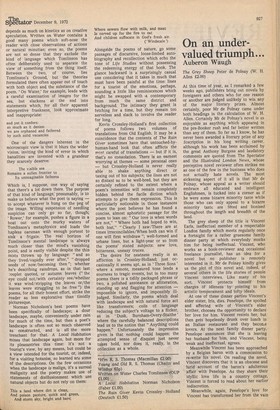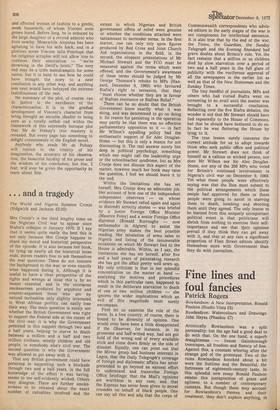On an under valued triumph...
Auberon Waugh
The Grey Sheep Peter de Polnay (W. H. Allen £2.00) At this time of year, as I remarked a few weeks ago, publishers bring out novels by foreigners and others who for one reason or another are judged unlikely to win any of the major literary prizes. Almost certainly, poor Mr de Polnay came under both headings in the calculation of W. H. Allen. Certainly Mr de Polnay's novel is as enjoyable as anything which appeared in the pre-Booker rush and far better written than any of them. So far as I know, he has never been awarded a literary prize of any description in his long writing career, although his work has been acclaimed by the great Anthony Burgess and laudatory comments are quoted from The Spectator and the Illustrated London News, whose perceptive novel reviewer often strikes me as one of the few in the business who does not actually hate novels. The most sickening aspect of it all is that Mr de Polnay, whose appeal as a writer should embrace all educated and intelligent Englishmen, is tucked into a corner as if he were some bizarre minority taste while those who can only appeal to a bizarre minority taste are feted and lionised throughout the length and breadth of the land.
The grey sheep of the title is Vincent Earls, ineffectual member of a respectable London family which meets regularly once a fortnight for a rather gruesome family dinner party at which everybody mocks him for being ineffectual. Vincent, who works as a book-reviewer and occasional freelance journalist, has an idea for a novel but no publisher is remotely interested in it. Mr de Polnay kindly gives us the plot of this novel and, indeed, of several others in the life stories of people Vincent interviews. Like many of his sort, Vincent protects himself from charges of idleness by pointing to his artistic temperament and lofty ideals.
At one of these dinner parties Vincent's elder sister, Iris, dies. Penelope, the spoiled and affected wife of Vincent's elder brother, chooses the opportunity to declare her love for him. Vincent resists her, but then gets hopelessly drunk over lunch in an Italian restaurant and they become lovers. At the next family dinner party, Penelope announces that she is leaving her husband for him, and Vincent, being weak and ineffectual, agrees.
Meanwhile Vincent has been approached by a Belgian baron with a commission to re-write his novel. On reading the novel, Vincent discovers that it is an obscene and lurid account of the baron's adulterous affair with Penelope. As they share their idyllic love life in a country cottage, Vincent is forced to read about her earlier indiscretion.
Meanwhile, again, Penelope's love for Vincent has transformed her from the vain and affected woman of fashion to a gentle, meek housewife, of whom Vincent soon grows bored. Before long, he is seduced by the large daughter of a retired admiral who lives nearby. Meanwhile Aloysius has been agitating to have his wife back, and in a glorious scene Vincent tells Penelope that his religious scruples will not allow him to continue their association — "we're drowning in the Devil's broth." The very end may be a trifle melodramatic for some tastes, but it is hard to see how he could have brought the story to a neat conclusion in any other way, and anything less neat would have betrayed the extreme fastidiousness of the rest.
No summary of the plot, of course, can do justice to the excellence of the characterisation. It is in the gradual development of Vincent's character from being thought an amiable idealist to being seen as a totally selfish cad within the framework of this extremely baroque plot that Mr de Polnay's true mastery is revealed. But every page has something to delight connoisseurs of the English novel.
Anybody who reads Mr de Polnay will rejoice in the vitality of his imagination, the accuracy of his observation, the beautiful lucidity of his prose and the wisdom of his conclusion, but few, I fear, will ever be given the opportunity to learn about him.











































 Previous page
Previous page